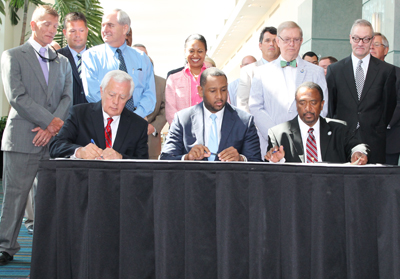Richland County is taking part in a local coalition, including Columbia and Lexington County, seeking state aid for a bundle of transportation projects that are collectively designed to stimulate economic development and improve traffic flow in the region.
Richland County Council Chair Norman Jackson and other leaders officially cemented the unprecedented partnership Monday at the Columbia Metropolitan Convention Center, where they signed a joint resolution to submit an application to the state’s infrastructure bank for a $336 million grant.
The proposal ties together multiple transportation projects that officials anticipate will have an impact beyond the Midlands.
“This marks a historic day in the Midlands,” Jackson said. “This project will foster economic competitiveness, enhance citizens’ quality of life and create a stronger economic base that will essentially alter the entire region as a whole for years to come.”
Local funding for the proposal comes solely from the County’s Transportation Penny Program. If the proposal secures state funding, the joint application would be the first of its kind in the region to be funded by the South Carolina Transportation Infrastructure Bank (SCTIB), also known as the state infrastructure bank or SIB.
Richland County is part of an alliance, called the United Midlands Coalition, formed with Columbia, Lexington County and the Columbia Metropolitan Airport.
In partnership with the Central Midlands Council of Governments and the University of South Carolina, the group collaborated to submit an application to the SCTIB to help fund several inter-related projects under the title, the United Midlands Multimodal Corridor Improvement Project.
During the ceremony, Jackson signed the joint resolution, along with Brian Newman, Columbia Mayor Pro Tem, and Johnny Jeffcoat, chair of Lexington County Council. This effort marks the first time the governments and other partners have teamed up to secure funding from the SCTIB.
The project will lessen traffic congestion, increase pedestrian safety and provide alternative modes of transportation through the following and additional improvements:
· Assembly and Huger streets: These major arteries would receive several enhancement measures to encourage development to include adding sidewalks and bus pick-up lanes, widening medians and updating intersections.
· Greene and Williams streets: Enhancements to these often overlooked streets include extending Williams Street from Gervais Street to Blossom Street, constructing the Greene Street Bridge over the railroad tracks and adding sidewalks and bike lines along Greene Street.
· Columbia Metropolitan Airport: In anticipation of growth, the completion of the John Hardee Expressway Airport Connector to include extending the roadway directly to I-26.
“Regional cooperation is crucial to the successful submittal of this transportation bank application,” Jackson said. “Richland County is proud to part of a team driven to improve the transportation infrastructure in the Midlands.”
The United Midlands will manage the funds to ensure the projects are completed. The application for state aid builds upon Richland County's prior commitment to use $446 million in Transportation Penny money for County projects. The United Midlands Coalition hopes Richland County’s local transportation investment will be persuasive in securing the state grant and enable the proposal to receive another $21 million in federal funding.
The SCTIB was created in 1997 to select and assist in financing major projects – exceeding $100 million – by providing loans and other assistance to construct and improve transportation facilities necessary for public purposes, including economic development.
The SCTIB is governed by a board of directors, which includes elected officials and those appointed by the Governor, Senate and House of Representatives. The board supports projects with funds approved by the state legislature.
Jackson emphasized the importance of the application is the unified front shown by the members of the coalition, and the vision to think beyond local borders. His philosophy is simple: If the City of Columbia or Lexington County benefits, so does Richland County. As an example, Jackson noted that if a business locates in one county, it will employ residents from the other.
“We have to think regionally,” he said.
